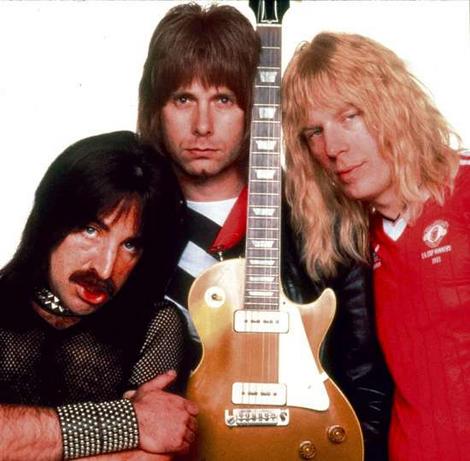The children born at Woodstock are preparing for the junior prom, and rock ‘n’ roll is still here to stay. Rock musicians never die, they just fade away, and “This Is Spinal Tap” is a movie about a British rock group that is rocketing to the bottom of the charts. It also is one of the funniest, most intelligent, most original films of the year.
The movie looks like a documentary filmed during the death throes of a British rock band named Spinal Tap. It is, in fact, a satire. The rock group does not really exist, but the best thing about this film is that it could. The music, the staging, the special effects, the backstage feuding and the pseudo-profound philosophizing are right out of a hundred other rock groups and a dozen other documentaries about rock.
The group is in the middle of an American tour. The tour is not going well. Spinal Tap was once able to fill giant arenas, but its audiences have grown smaller and smaller, and concert dates are evaporating as the bad news gets around. No wonder. Spinal Tap is a bad rock ‘n’ roll band. It is derivative, obvious, phony and pretentious, and it surrounds itself with whatever images seem commercial at the moment (a giant death’s head on stage, for one).
The movie is absolutely inspired in the subtle way it establishes Spinal Tap’s badness. The satire has a deft, wicked touch. Spinal Tap is not that much worse than, not that much different from, some successful rock bands. A few breaks here or there, a successful album, and they could be back in business. (Proof of that: A soundtrack album, “Smell the Glove,” is getting lots of airplay with cuts like “Sex Farm”).
The documentary is narrated by its director, Marty DiBergi, played by Rob Reiner, the director of the real movie. He explains that he was first attracted to the band by its unusual loudness. He follows them on tour, asking profound questions that inspire deep, meaningless answers, and his cameras watch as the group comes unglued.
One of the band members brings in a girlfriend from England. She feuds with the group’s manager. Bookings are canceled. The record company doesn’t like the cover for the group’s new album. One disastrous booking takes Spinal Tap to a dance in a hangar on a military base. The movie is brilliant at telling its story through things that happen in the background and at the edges of the picture: By the end of the film, we know as much about the personalities and conflicts of the band members as if the movie had been straightforward narrative.
There are a lot of great visual jokes, which I don’t want to spoil—especially the climax of the band’s Stonehenge production number, or another number that involves them being reborn from womblike stage props. There also are moments of inspired satire aimed at previous styles in rock films, as when we get glimpses of Spinal Tap in its earlier incarnations (the band started as sort of a folk group, plunged into the flower people generation, and was a little late getting into heavy metal, satanism and punk).
“This Is Spinal Tap” assumes that audiences will get most of the jokes. I think that’s right. “Entertainment Tonight” and music TV and Barbara Walters specials have made show-business trade talk into national gossip, and one of the greatest pleasures of the movie is that it doesn’t explain everything. It simply, slyly, destroys one level of rock pomposity after another.



















